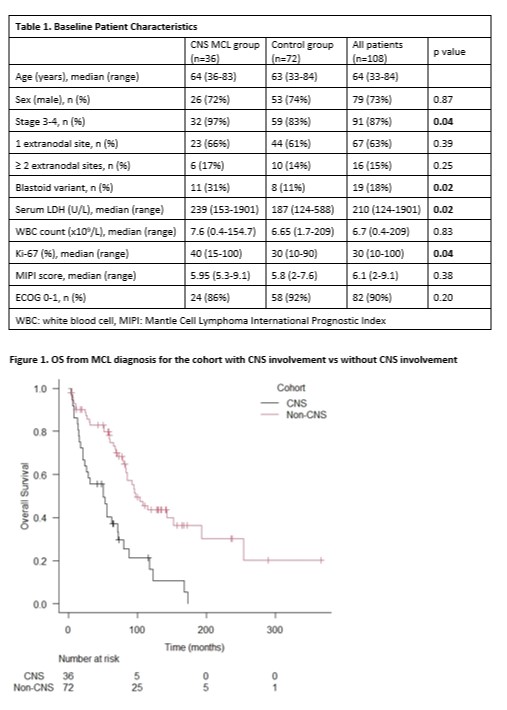Abstract
Background: While extranodal involvement by mantle cell lymphoma (MCL) is relatively common, involvement of the central nervous system (CNS) is rare (<5% of cases), with limited treatment options. We report the outcomes of 36 patients (pts) with CNS involvement compared to 72 matched control MCL pts without CNS involvement.
Methods: MCL pts with CNS involvement seen at Mayo Clinic between 1/1995-9/2020 were identified using the Mayo Data Explorer tool. CNS involvement was defined by tissue biopsy confirmed CNS MCL, CSF analysis demonstrating lymphoma cells, and/or neuroimaging findings compatible with CNS involvement. A 2:1 control group of MCL pts without CNS involvement, matched by age (+/- 2 years) and year of diagnosis (+/- 1 year), was selected among all MCL cases. Medical records were reviewed for baseline characteristics, treatment modalities, and outcomes. Kaplan-Meier method was used for time to event analysis. Wilcoxon test was used to compare continuous variables and Chi square test was used for categorical variables.
Results: Out of 1,753 pts with MCL, 36 (2%) had evidence of CNS involvement, including 4 pts with CNS involvement at initial MCL diagnosis. Baseline characteristics of pts with CNS involvement (CNS MCL group) and those without CNS involvement (control group) are shown in Table 1. At MCL diagnosis, non-CNS extranodal involvement was seen in 30 (83%) pts in the CNS MCL group (24 pts with 1 site and 6 pts with ≥ 2 sites), with bone marrow being the most common extranodal site of involvement (n=24, 67%). For the control group, 54 (75%) pts had extranodal involvement (44 pts with 1 site and 10 pts with ≥ 2 sites), and bone marrow was also the most common extranodal site of involvement (n=50, 69%).
Notably, advanced stage disease (stage 3-4) was more commonly seen in the CNS MCL group (n=32, 97%) than in the control group (n=59, 83%) (p=0.04) at MCL diagnosis. Blastoid variant was present in a higher proportion of pts in the CNS MCL group (n=11, 31%) compared to the control group (n=8, 11%) (p=0.02). The CNS MCL group also presented with a higher median serum LDH at diagnosis (239 U/L [range 153-1901] vs. 187 U/L [range 124-588], p=0.02), and higher Ki-67 (40% [range 15-100] vs. 30% [range 10-90], p=0.04) compared to the control group.
The most common frontline treatment regimen was anthracycline-based therapies (i.e. R-CHOP, Nordic regimen, R-hyperCVAD) for both groups (58% in CNS MCL group and 56% in control group). 14 (39%) pts in the CNS MCL group underwent autologous stem cell transplant in CR1 vs. 31 pts (43%) in the control group. Similar use of rituximab maintenance was seen in both groups (31% in CNS MCL group and 25% in control group). Median total lines of therapy from initial MCL diagnosis was 3 (range 1-9) in CNS MCL group and 2 (range 1-9) in the control group.
The median follow-up from MCL diagnosis was 134 months (95% CI:119-163) for the entire cohort. Median OS from MCL diagnosis was 50.3 months (95% CI: 20.9-71.1) for the CNS MCL group compared to 97.1 months (95% CI: 82.6-192.7; p=<0.001) for the control group (Figure 1). Median time from MCL diagnosis to CNS involvement was 25 months (range 0-167). Median OS from CNS involvement was 4.7 months (95% CI: 2.3-6.7). At last follow up, 31 (86%) pts were deceased from the CNS MCL group, compared to 38 (52%) pts in the control group. For the CNS MCL group, the causes of death were CNS lymphoma in 10 (32%) pts, systemic lymphoma in 9 (29%) pts, treatment-related complication in 7 (23%) pts, and other/unknown in 5 (16%) pts. For the control group, the causes of death were systemic lymphoma in 15 (39%) pts, treatment-related in 2 (5%) pts, and other/unknown in 21 (55%) pts.
Conclusion: In pts with MCL, CNS involvement is associated with worse outcomes as evident by a shorter median OS from initial MCL diagnosis (50 months vs. 97 months). Involvement of the CNS by lymphoma is an important contributor for the shorter OS as suggested by the median OS of only 5 months from CNS involvement. Advanced stage, blastoid variant, elevated LDH, and elevated Ki67 at MCL diagnosis were features more commonly seen in the CNS MCL cohort. Validation of risk factors at initial MCL diagnosis associated with CNS involvement and exploring the role of CNS prophylaxis are important topics for further investigation.
Paludo: Karyopharm: Research Funding. Wang: Novartis: Research Funding; TG Therapeutics: Membership on an entity's Board of Directors or advisory committees; MorphoSys: Research Funding; InnoCare: Research Funding; Eli Lilly: Membership on an entity's Board of Directors or advisory committees; LOXO Oncology: Membership on an entity's Board of Directors or advisory committees, Research Funding; Incyte: Membership on an entity's Board of Directors or advisory committees, Research Funding; Genentech: Research Funding. Bennani: Purdue Pharma: Other: Advisory Board; Daichii Sankyo Inc: Other: Advisory Board; Kyowa Kirin: Other: Advisory Board; Vividion: Other: Advisory Board; Kymera: Other: Advisory Board; Verastem: Other: Advisory Board. Nowakowski: Celgene, MorphoSys, Genentech, Selvita, Debiopharm Group, Kite/Gilead: Consultancy, Membership on an entity's Board of Directors or advisory committees; Celgene, NanoString Technologies, MorphoSys: Research Funding. Witzig: Karyopharm Therapeutics, Celgene/BMS, Incyte, Epizyme: Consultancy, Membership on an entity's Board of Directors or advisory committees; Celgene/BMS, Acerta Pharma, Kura Oncology, Acrotech Biopharma, Karyopharm Therapeutics: Research Funding. Habermann: Seagen: Other: Data Monitoring Committee; Tess Therapeutics: Other: Data Monitoring Committee; Incyte: Other: Scientific Advisory Board; Morphosys: Other: Scientific Advisory Board; Loxo Oncology: Other: Scientific Advisory Board; Eli Lilly & Co.,: Other: Scientific Advisor. Ansell: Bristol Myers Squibb, ADC Therapeutics, Seattle Genetics, Regeneron, Affimed, AI Therapeutics, Pfizer, Trillium and Takeda: Research Funding.


This feature is available to Subscribers Only
Sign In or Create an Account Close Modal